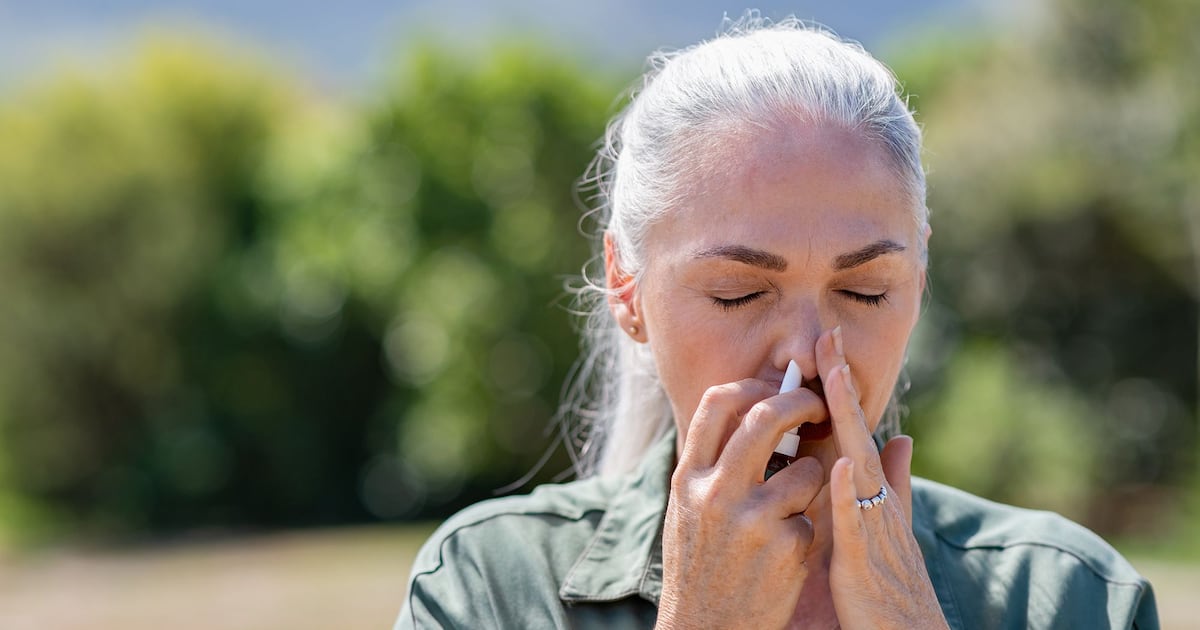Health
Common Nasal Spray Shown to Reduce Covid-19 Infection Rates

A new study has revealed that a common nasal spray, azelastine, may significantly reduce the likelihood of contracting Covid-19. Published in the journal JAMA Internal Medicine on September 2, 2023, this randomized, placebo-controlled trial found that the risk of developing the virus was approximately three times lower in participants using azelastine compared to those receiving a placebo.
This research comes at a time when many individuals are grappling with questions regarding vaccine eligibility and access. The study involved 450 healthy adult volunteers in Germany, all of whom had received at least one dose of a Covid-19 vaccine. Participants were divided into two groups: one received azelastine nasal spray three times daily for an average of 56 days, while the other group received a placebo.
Understanding Azelastine and Its Uses
Azelastine, also marketed under the brand names Astelin and Astepro, is an antihistamine primarily used to alleviate allergy symptoms such as a runny or stuffy nose, sneezing, and itching. Approved by the US Food and Drug Administration (FDA) in 1996, azelastine is effective for both seasonal and perennial allergic rhinitis. The medication is available in generic forms, although one brand, Astepro Allergy, can be purchased over-the-counter at pharmacies.
Dr. Leana Wen, a wellness expert and clinical associate professor at George Washington University, explained that early in the pandemic, researchers began to explore existing medications that could potentially be repurposed to combat Covid-19. Laboratory studies suggested that azelastine could bind to a receptor used by the coronavirus to enter human cells and might also diminish viral levels in nasal tissue.
Study Design and Findings
The recent study was a double-blind, placebo-controlled phase 2 clinical trial. Participants were tested for Covid-19 twice weekly using rapid antigen tests, with positive results confirmed through laboratory polymerase chain reaction (PCR) testing. The data indicated a marked difference in Covid-19 infection rates: only 2.2% of the azelastine group tested positive, compared to 6.7% in the placebo group. Additionally, the average duration of a positive test was shorter for those using azelastine, lasting an average of 3.40 days versus 5.14 days for the placebo group.
The outcomes were not limited to Covid-19; the azelastine group also showed a lower incidence of other respiratory viruses. Only 8.4% of participants using azelastine were diagnosed with any tested respiratory virus, as opposed to 18.8% in the placebo cohort. Participants using azelastine reported fewer illness days, averaging 1.73 days compared to 2.75 days for those receiving the placebo.
Dr. Wen characterized the study as well-executed, highlighting its implications for potential preventive measures against SARS-CoV-2 and other respiratory viruses. She noted that the percentage reduction in Covid-19 infections aligns with the effectiveness seen in various vaccine strategies. Given its accessibility and established safety profile, azelastine could be a cost-effective option for enhancing protection against Covid-19.
Despite the promising results, Dr. Wen cautioned against using azelastine as a substitute for existing preventive measures. The FDA has not approved the nasal spray for Covid-19 prevention, and she emphasized the importance of vaccination and masking as primary defenses against the virus.
As Covid-19 cases rise again, Dr. Wen recommends that individuals eligible for the updated vaccine should get vaccinated. For those at higher risk of severe disease, she advises avoiding crowded indoor spaces and wearing a well-fitting N95 mask in such environments. Anyone experiencing respiratory symptoms should remain at home to minimize the risk of spreading not only Covid-19 but also other respiratory illnesses.
The findings from this study represent an important step in understanding the potential role of azelastine in preventing Covid-19 and warrant further clinical exploration.
-

 World4 months ago
World4 months agoScientists Unearth Ancient Antarctic Ice to Unlock Climate Secrets
-

 Entertainment4 months ago
Entertainment4 months agoTrump and McCormick to Announce $70 Billion Energy Investments
-

 Lifestyle4 months ago
Lifestyle4 months agoTransLink Launches Food Truck Program to Boost Revenue in Vancouver
-

 Science4 months ago
Science4 months agoFour Astronauts Return to Earth After International Space Station Mission
-

 Technology2 months ago
Technology2 months agoApple Notes Enhances Functionality with Markdown Support in macOS 26
-

 Top Stories3 weeks ago
Top Stories3 weeks agoUrgent Update: Fatal Crash on Highway 99 Claims Life of Pitt Meadows Man
-

 Sports4 months ago
Sports4 months agoSearch Underway for Missing Hunter Amid Hokkaido Bear Emergency
-

 Politics3 months ago
Politics3 months agoUkrainian Tennis Star Elina Svitolina Faces Death Threats Online
-

 Technology4 months ago
Technology4 months agoFrosthaven Launches Early Access on July 31, 2025
-

 Politics4 months ago
Politics4 months agoCarney Engages First Nations Leaders at Development Law Summit
-

 Entertainment4 months ago
Entertainment4 months agoCalgary Theatre Troupe Revives Magic at Winnipeg Fringe Festival
-

 Top Stories1 week ago
Top Stories1 week agoFamily Remembers Beverley Rowbotham 25 Years After Murder





















